|
|
|
Sort Order |
|
|
|
Items / Page
|
|
|
|
|
|
|
| Srl | Item |
| 1 |
ID:
159971
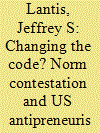

|
|
|
|
|
| Summary/Abstract |
Cyberspace appears to offer limitless possibilities for collaboration and economic opportunity in the twenty-first century, but cyber-attacks, breaches of privacy, and security threats also have become commonplace. In the face of these challenges, a number of governments have been locked in debates over the future of cyberspace governance, including the Russian Republic, the People’s Republic of China, and the United States. This study examines the ongoing contestation of the international normative architecture for cyberspace, with a focus on the United States’ role as a norm ‘antipreneur’, seeking to defend the status quo multi-stakeholder norm for a more open Internet from entrepreneurial efforts by Russia and China to establish multilateral governance with ‘cyber-sovereignty’. Drawing on recent advances in constructivist theory, the study explores antipreneurial strategies to contest efforts by entrepreneurs to introduce new norms, as well as implications for norm development and change. Process tracing is employed to examine cyberspace governance debates. The study concludes by discussing prospects for an International Code of Conduct for Cyberspace, as well as theoretical and political implications of antipreneurship in modern norm contestations.
|
|
|
|
|
|
|
|
|
|
|
|
|
|
|
|
| 2 |
ID:
184665


|
|
|
|
|
| Summary/Abstract |
Like other normative systems, the international nuclear export control norms are incomplete and at times contradictory. Thus, contestations to the international nuclear export control norms inevitably emerge, as they did in the wake of the 1974 Indian nuclear test and the 1991 discovery of Iraq’s nuclear weapons program. These two nuclear crises prompted intense debates regarding the adequacy of the existing norms. The outcome of the debates generated overwhelming agreement and action among nuclear suppliers that they required strengthening. Drawing on Wayne Sandholtz’s theory of normative change, which argues that events trigger disputes whose outcomes modify norms, this article illustrates how the nuclear export control norms have evolved in a cyclical fashion. The article aims to contribute to the constructivist literature on normative change and discusses policy implications.
|
|
|
|
|
|
|
|
|
|
|
|
|
|
|
|
| 3 |
ID:
165869


|
|
|
|
|
| Summary/Abstract |
Whether it is the persecution of the Rohingya, the disappearance of human rights activists, the general limiting of freedom of speech across the region, or the resumption of the arbitrary use of the death penalty, Southeast Asia can be said to be facing a human rights crisis. This human rights crisis is though occurring at a time when the region’s institution, the Association of Southeast Asian Nations (ASEAN), has never been so interested in human rights. After a lengthy period of time in which ASEAN either ignored, or paid lip service to human rights, the Association has created a human rights body – the ASEAN Intergovernmental Commission on Human Rights (AICHR) – and adopted an ASEAN Human Rights Declaration (AHRD). In this article, I utilize the Spiral Model to explain how, when ASEAN member states are regressing in their commitment to human rights, an intergovernmental body continues to promote their commitment and lay the groundwork for their compliance.
|
|
|
|
|
|
|
|
|
|
|
|
|
|
|
|
| 4 |
ID:
180560
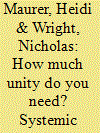

|
|
|
|
|
| Summary/Abstract |
The Common Foreign & Security Policy (CFSP) is a transnational policy framework to deliver collective foreign policy and also to manage differences among member states. As such, it has always been dependent on their support. Since 2019, however, disagreement within this system is said to have reached a new level. Taking this political trend as our starting point, this article proposes a new, conceptual approach to understanding how contestation challenges the EU’s foreign policy cooperation system. While the majority of research focuses on disagreements in decision-making, we argue for a broader conceptualisation – systemic contestation. Drawing on norm contestation scholarship, we argue that systemic contestation manifests itself in two ways: as passive contestation, when member states disengage from and fail to take ownership of CFSP initiatives and their implementation; and as tacit contestation, when they fail to act when faced with the need to safeguard the system. This approach accounts for the transgovernmental character of the CFSP; and the central role of member states within it. Finally, we contend that our conceptualisation of systemic contestation offers promising new avenues for empirical research to understand the “black box” of EU foreign policy cooperation.
|
|
|
|
|
|
|
|
|
|
|
|
|
|
|
|
| 5 |
ID:
184649


|
|
|
|
|
| Summary/Abstract |
This article assesses recent UN reforms to enhance the organization’s capacity to prevent violent conflict. These reforms target crucial inefficiencies within the UN that have hampered effective preventive and protection practices in violent conflict and atrocities. The article argues that state actors have viewed the reform process as a site of norm contestation, and negotiations have created an avenue for compromises on the centrality of human rights and political backstopping of UN missions in volatile field contexts that are vital to better prevention and protection outcomes. Contestation by state actors is significant in steering the outcomes of institutional reform as states advance their normative agendas, and seek to integrate these preferences into new institutional structures that are open to negotiation through the reform process. A broad assessment of these reforms confirms the move toward a more pragmatic vision of peace and security in the UN to accommodate global power shifts.
|
|
|
|
|
|
|
|
|
|
|
|
|
|
|
|
| 6 |
ID:
193029


|
|
|
|
|
| Summary/Abstract |
This research problematizes the contested nature of the global norm diffusion by focusing on intra-group rivalries and fragmentations shaping local responses (often reactionary and resistant) to global norms. Such an examination is important primarily to account for what leads to shifts in the local reception of norms over time. This study empirically explores local fragmentation, rivalry and change in response nexus in the example of the reception of the global gender equality norms in Turkey by the conservative normative bloc. It reveals that the conservative bloc is not a monolithic normative order and that there are two main competing receptions of the gender equality norm within the group in Turkey. With a firm emphasis on Turkey’s first initiating and later withdrawal from the Istanbul Convention, the study elaborates how the institutionalized conservative response to gender equality has shifted from a compromising acceptance to a rejection over time.
|
|
|
|
|
|
|
|
|
|
|
|
|
|
|
|
| 7 |
ID:
152748


|
|
|
|
|
| Summary/Abstract |
This article builds on recent literature to argue that emerging economies are simultaneously norm takers and norm makers involved in a two-way socialization process with developed countries. It does this by tracing China's engagement in negotiations surrounding the norm of common but differentiated responsibilities within the UN Framework Convention on Climate Change between the 2007 Bali conference that set out to negotiate a post–Kyoto Protocol climate agreement and the 2015 Paris conference that succeeded in doing so. In making this argument, I push against the predominant unidirectional and dyadic models of normative change by illuminating the more complicated role emerging economies are playing in this process. The article further distills a typology of normative change from the literature to help us understand how and why emerging economies engage in this process.
|
|
|
|
|
|
|
|
|
|
|
|
|
|
|
|
| 8 |
ID:
163070


|
|
|
|
|
| Summary/Abstract |
Norm contestation by local actors has emerged in recent years as an explanation for the failure of norm diffusion. This article contributes to the literature on norm contestation by analysing how norms diffused by the Organisation for Security and Cooperation in Europe (OSCE) pertaining to election observation and free and fair voting are re-constituted and contested by domestic actors in Kazakhstan. The study contributes to the idea of ‘constitutive localisation’ by emphasising a more fundamental level of disagreement beyond just congruence between the diffused norm and local beliefs; by demonstrating contestation can occur in the later stages in the norm diffusion cycle; by focusing on the micro-politics of contestation by local actors involved in the implementation of diffused norms; and by revealing how norm contestation is not necessarily a process of emancipatory politics, but a strategic act to serve authoritarian consolidation. Utilising a four-fold framework, the analysis illustrates how norms, while initially accepted by Kazakhstani authorities, are reconstituted through political discourse and/or practice, creating the moment of contestation. While this contestation is instrumentalised by political elites for their own advantage, it also remains an important element of agency within a normative order which they had little previous control over.
|
|
|
|
|
|
|
|
|
|
|
|
|
|
|
|
| 9 |
ID:
186101
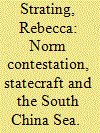

|
|
|
|
|
| Summary/Abstract |
Since 2009, the South China Sea disputes have taken on increasing global significance. Situated within a rapidly transforming political landscape, these sovereignty and maritime disputes are totemic of contests over the regional security order and the institutions, rules and laws that support it. The United States has explicitly called upon ‘like-minded’ allies and partners to defend the so-called ‘rules-based order’ against the revisionism of the rising People’s Republic of China, including in the maritime domain. In particular, the South China Sea has become a highly visible arena of ‘normative contestation’, one that raises questions about how norm-preservationist regional powers enact security practices to uphold their preferred vision of order. This study uses Australia as a regional power case study to assess the interests and approaches of a key US ally to normative contestation in the South China Sea. It addresses two questions: first, how does Australia perceive and articulate its interests in the South China Sea? Second, what security practices - diplomatic, legal and operational – can a regional power such as Australia bring to bear in its statecraft? It argues that as a regional power, Australia has adopted a normative approach to upholding maritime order. While Canberra has ratcheted up the rhetoric on the importance of maintaining the ‘rules-based order’ in response to China’s actions in the South China Sea, its security practices have retained a routine, ‘business-as-usual’ quality. This approach is designed to support maritime rules while avoiding economic retaliation from Beijing, reflecting broader strategic dilemmas as a middle-sized state wedged between two great powers. Unpacking the nuances of Australia’s South China Sea statecraft provides important insights for understanding for the preparedness and limitations of regional powers in defending their preferred conception of maritime order.
|
|
|
|
|
|
|
|
|
|
|
|
|
|
|
|
| 10 |
ID:
164460


|
|
|
|
|
| Summary/Abstract |
This article begins by critically assessing some of the current measures used to evaluate the status and impact of the Responsibility to Protect (RtoP). It then lays the groundwork for a deeper examination of RtoP's strength by specifying what kind of norm it is, and what it can reasonably be expected to do. The third section engages Zimmerman and Deitelhoff's framework on norm robustness and contestation by positing two arguments. First, the past decade of diplomatic engagement and policy development has brought about greater consensus on RtoP's core elements, and thus enhanced its validity; however, this process has also dampened many of RtoP's original cosmopolitan aspirations. Second, persistent applicatory contestation about RtoP's so-called third pillar is revealing deeper concerns about the norm's justification – thereby leading some actors to avoid framing situations with RtoP terminology. I use two cases to address the broader theoretical questions raised about whether and how language matters in assessing norm robustness: the international community's response to the deepening political violence in Burundi in 2015, and the evolution of the international community's response to the war in Syria (2011–17). While these cases illustrate changing perceptions of the political utility of RtoP language, concrete engagement by the international community, particularly in the Burundi case, indicates that RtoP's validity remains intact. The article concludes that norm decay is not equivalent to norm death, and that RtoP's prescriptions will survive given that they are embedded in a broader normative structure of human rights, humanitarian law, and civilian protection.
|
|
|
|
|
|
|
|
|
|
|
|
|
|
|
|
| 11 |
ID:
164457


|
|
|
|
|
| Summary/Abstract |
The introduction develops this special issue's main research question: under which conditions are challenges to norms likely to decrease their robustness? The issue presents current research on contestation and norm robustness and discusses its limitations. We conceptualize a norm's robustness by examining both the practical and discursive dimensions. Robustness is high when norm addressees express widespread discursive acceptance of a norm's claims (validity) that also generally guide addressees’ actions (facticity). When normative claims are discursively rejected by most addressees and do not guide their actions, robustness is low. The contributions develop four broad indicators for measuring robustness (concordance, third-party reactions to norm violation, compliance, and implementation). The norms analyzed here were not easily eroded; despite direct challenges, they remained surprisingly robust. This indicates that norm robustness is not determined by the relative power of norm challengers, but rather types of contestation and structural factors. These include being embedded in larger normative structures, institutionalization, and legal character, although effects of these factors are more ambivalent than norm research has usually supposed.
|
|
|
|
|
|
|
|
|
|
|
|
|
|
|
|
| 12 |
ID:
180351
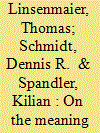

|
|
|
|
|
| Summary/Abstract |
This article offers a new conceptualisation of the meaning of norms in world politics. It starts from the observation that existing norm scholarship in International Relations has underestimated the role of ambiguity in the constitution of norm meaning. To address this shortcoming, we advance a conceptualisation that sees norm polysemy – the empirically observable plurality of norm meanings-in-use – as resulting from the enactment of inherently ambiguous norms in different contexts. By foregrounding norm ambiguity, this view offers a radically non-essentialist understanding of norm meaning, one that eschews any attempt to salvage final or ‘true’ meanings behind the polysemy of norms. Using empirical illustrations from different fields of contemporary global governance, we identify four mechanisms through which actors practically cope with the multiplicity of norm meanings that arises from norm ambiguity (deliberation, adjudication, uni- or multilateral fixation attempts, and ad hoc enactment) and outline their varying effects on the legitimacy and effectiveness of global governance. Based on this discussion, the article points to the normative implications of a radically non-essentialist conception of norms and suggests harnessing the positive potential of norm ambiguity as an ethically desirable condition that promotes human diversity and the plurality of global life.
|
|
|
|
|
|
|
|
|
|
|
|
|
|
|
|
| 13 |
ID:
171767


|
|
|
|
|
| Summary/Abstract |
Contestation of international norms has become the new focus of IR norm research. The optimism of the 1990s that fundamental liberal norms would diffuse globally has remained unfulfilled in recent years—even human rights norms have witnessed strong contestation. Time and again, controversy has erupted regarding international norms such as the ban on torture or the Responsibility to Protect. Meanwhile, we know little about how such controversy affects the robustness of norms—whether it contributes to their weakening or to their strengthening. Existing research offers two competing hypotheses: One branch of norm research often conceptualizes contestation as a sign of norm weakening. By contrast, another branch assigns contestation a normative power of its own, which strengthens norms. It does not specify the limits of such normative power, however. In this article, we argue that contestation per se is a poor predictor of norm robustness. The type of contestation a norm faces matters. Contestation can either (1) address the dimension of application of a norm or (2) examine its validity by questioning the righteousness of the claims a norm makes. The article draws on two illustrative case studies of extensively contested norms, the Responsibility to Protect and the ban on commercial whaling. We argue that widespread contestation of the very validity of a norm is likely to lead to a loss of norm robustness. Applicatory contestation, by contrast, can—under specific circumstances—even strengthen it.
|
|
|
|
|
|
|
|
|
|
|
|
|
|
|
|
| 14 |
ID:
168497


|
|
|
|
|
| Summary/Abstract |
This article uses the reflection on the direction (whither) and health (wither) of constructivism and the Association of Southeast Asian Nations (ASEAN) that was witnessed in 2017 to see what these deliberations reveal about the fixity of norms and their contestation. The argument presented is that constitutive norms create fixed parameters of shared understandings but that within those parameters the meaning and application of the norm can be contested and debated. This insight helps to bridge the gap between conventional and critical constructivists and shows that the premise of jettisoning the ASEAN Way as necessary for ASEAN to achieve its ambitious community-building project is flawed. The argument relies on insights from the constructivist literature on norm degeneration to show how contestation is not one part of a norm’s life cycle but rather a constant companion. However, norms are not just contested, but they have fixity, and here practice theory can help show that the social world is just as much about continuity as it is change. The ASEAN case study is timely as introspection about the efficacy of its constitutive norms – the ASEAN Way – was prominent in 2017 as ASEAN turned 50.
|
|
|
|
|
|
|
|
|
|
|
|
|
|
|
|
| 15 |
ID:
187031
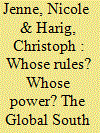

|
|
|
|
|
| Summary/Abstract |
International organisations reflect global power configurations and as such, are deemed to reproduce global inequalities. Nevertheless, they also represent opportunities for the Global South to challenge the global stratification of power, for instance by providing personnel to international agencies and bureaucracies. This article examines the role of leadership personnel from the Global South in implementing robust peacekeeping mandates.
Given that states from the Global South have often been hesitant to support the use of force internationally, can leadership positions in peace operations help these states to influence norms at the implementation level? We develop a conceptual understanding of individuals’ role in implementing norms and apply the framework to military force commanders from Brazil, India, and Rwanda. The analysis demonstrates that appointments provide an opportunity for norm contestation, but do not necessarily guarantee such influence. Under certain circumstances, we find that military force commanders can actually undermine their governments’ preferences. However, the relation between force commanders’ practices and their country of origin's policy stance is complex and influenced by a variety of different factors that merit further investigation.
|
|
|
|
|
|
|
|
|
|
|
|
|
|
|
|
|
|
|
|
|